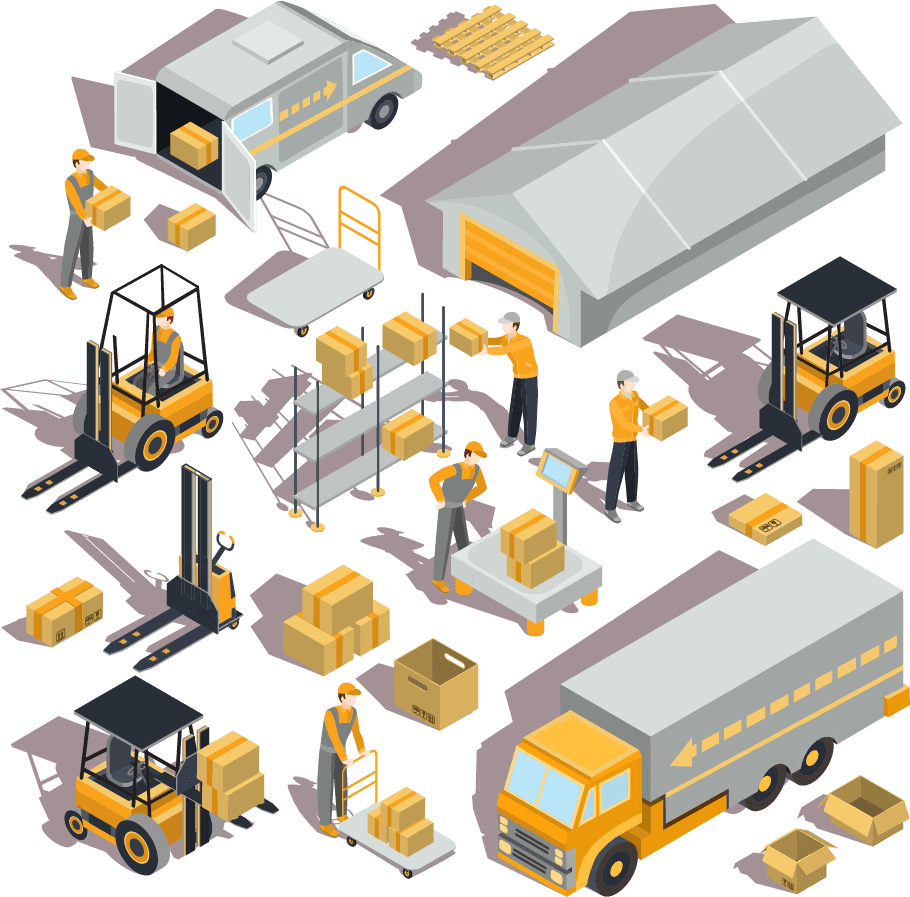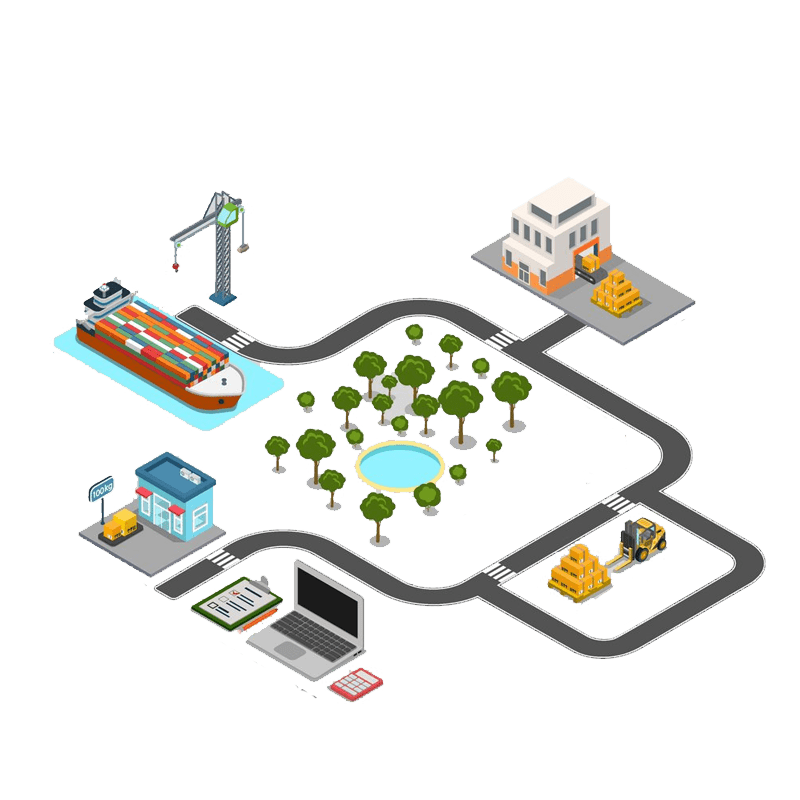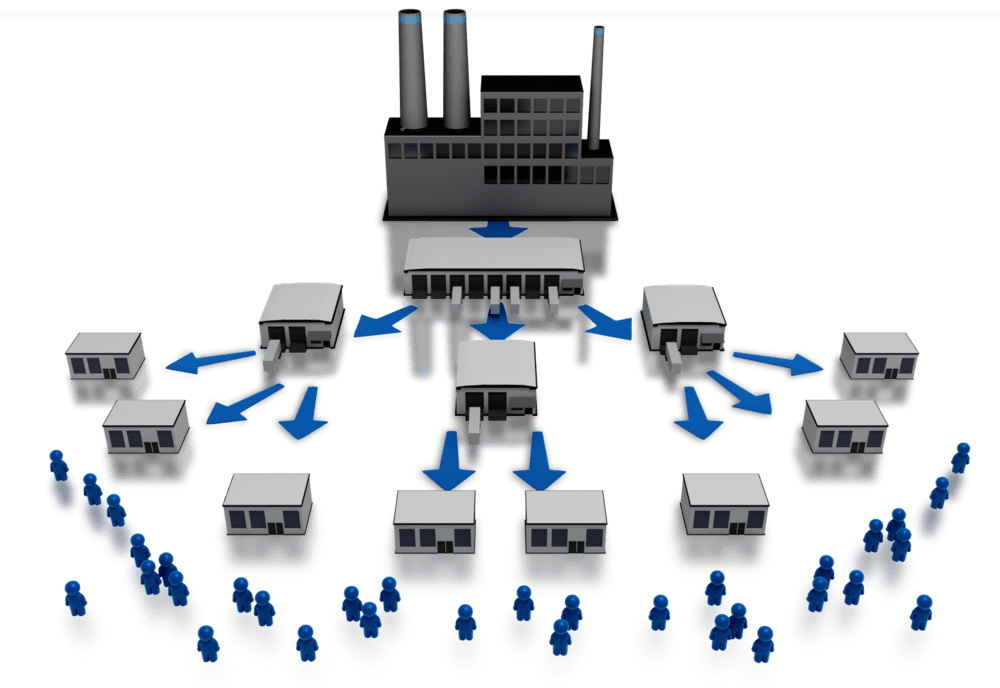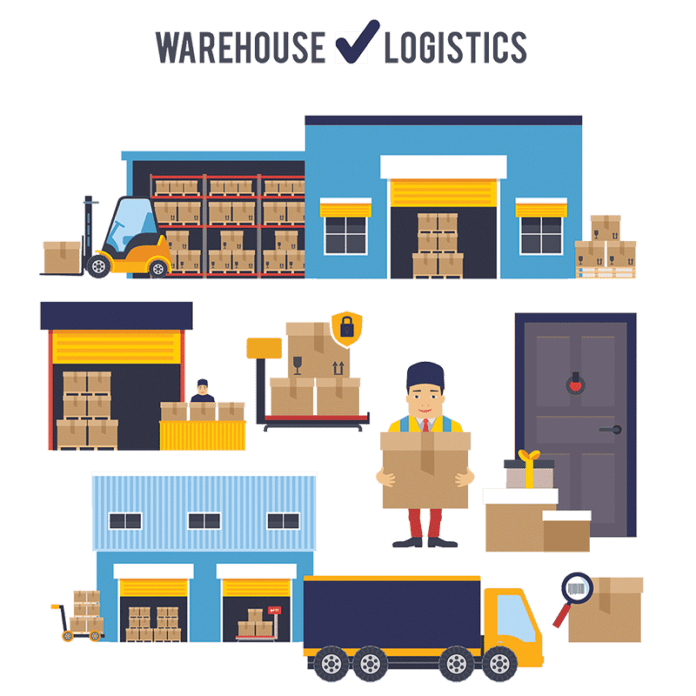Logistics is the process of planning, organizing, and managing the flow of goods, services, and information from the point of origin to the point of consumption. It is a broad term that encompasses a wide range of activities, such as transportation, warehousing, inventory management, packaging, and order fulfillment.
The goal of logistics is to ensure that goods are delivered to the right place at the right time in the right quantity at the lowest possible cost. This can be a complex task, especially in today’s global economy, where goods often travel long distances before reaching their final destination.
There are five main elements of logistics:

Transportation:
This is the movement of goods from one location to another. The most common modes of transportation are road, rail, air, and sea.
Warehousing:
This is the storage of goods in a safe and secure location. Warehouses can be either public or private.
Inventory management:
This is the process of tracking and managing the flow of goods in a warehouse. It includes tasks such as ordering, receiving, storing, and picking.
Packaging:
This is the process of preparing goods for transportation and storage. It includes tasks such as labeling, shrink-wrapping, and palletizing.
Order fulfillment:
This is the process of getting goods from the warehouse to the customer. It includes tasks such as picking, packing, shipping, and tracking.
Logistics is an essential part of any business that sells goods or services. By optimizing their logistics, businesses can improve their efficiency, reduce their costs, and improve customer satisfaction.
Here are some examples of logistics:

- A company that manufactures cars needs to coordinate the transportation of raw materials, the production of the cars, and the delivery of the cars to dealerships.
- A retailer needs to manage the inventory of its products, ensure that the products are delivered to stores on time, and provide a way for customers to return unwanted products.
- A shipping company needs to plan the routes of its trucks and ships, ensure that the goods are loaded and unloaded efficiently, and track the progress of shipments.
Logistics is a complex and ever-changing field. New technologies are constantly being developed to improve the efficiency and effectiveness of logistics operations. As a result, the demand for logistics professionals is expected to grow in the coming years.
What is logistics in simple words ?

In simple words, logistics is the process of moving things from where they are to where they need to be. It includes everything from transportation and warehousing to inventory management and packaging. The goal of logistics is to get things where they need to be as quickly, cheaply, and efficiently as possible.
Here are some examples of logistics in everyday life:
- When you order a product online, logistics is involved in getting the product from the warehouse to your door.
- When you go to the grocery store, logistics is involved in getting the food from the farm to the shelves.
- When you take a flight, logistics is involved in getting you from the airport to your destination.
Logistics is a vital part of our economy. It allows us to get the goods and services we need when we need them, and it helps to keep our businesses running smoothly.
Here are some of the key activities involved in logistics:
- Transportation: This is the movement of goods from one location to another.
- Warehousing: This is the storage of goods in a safe and secure location.
- Inventory management: This is the process of tracking and managing the flow of goods in a warehouse.
- Packaging: This is the process of preparing goods for transportation and storage.
- Order fulfillment: This is the process of getting goods from the warehouse to the customer.
- Reverse logistics: This is the process of returning goods from the customer to the supplier.
Logistics is a complex and challenging field, but it is also a very rewarding one. Logistics professionals play a vital role in our economy, and they are always in high demand. If you are interested in a career in logistics, there are many opportunities available.
What is a role of logistics?

The role of logistics is to ensure that goods are delivered to the right place at the right time in the right quantity at the lowest possible cost. This can be a complex task, especially in today’s global economy, where goods often travel long distances before reaching their final destination.
The specific roles of logistics can vary depending on the industry and the specific needs of the business. However, some of the most common roles of logistics include:
- Transportation: This is the movement of goods from one location to another. The most common modes of transportation are road, rail, air, and sea.
- Warehousing: This is the storage of goods in a safe and secure location. Warehouses can be either public or private.
- Inventory management: This is the process of tracking and managing the flow of goods in a warehouse. It includes tasks such as ordering, receiving, storing, and picking.
- Packaging: This is the process of preparing goods for transportation and storage. It includes tasks such as labeling, shrink-wrapping, and palletizing.
- Order fulfillment: This is the process of getting goods from the warehouse to the customer. It includes tasks such as picking, packing, shipping, and tracking.
- Reverse logistics: This is the process of returning goods from the customer to the supplier.
Here are some of the benefits of good logistics:
- Increased efficiency: By optimizing their logistics, businesses can reduce the time and cost it takes to get goods to market.
- Reduced costs: By streamlining their logistics operations, businesses can save money on transportation, warehousing, and inventory management.
- Improved customer satisfaction: By ensuring that goods are delivered on time and in good condition, businesses can improve customer satisfaction and loyalty.
- Increased flexibility: By having a flexible logistics system, businesses can adapt to changes in demand and supply.
- Improved risk management: By having a robust logistics system, businesses can minimize the risk of disruptions and delays.
Logistics is a complex and ever-changing field. New technologies are constantly being developed to improve the efficiency and effectiveness of logistics operations. As a result, the demand for logistics professionals is expected to grow in the coming years.
Here are some of the specific roles of logistics in different industries:
- Retail: In the retail industry, logistics is responsible for ensuring that goods are delivered to stores on time and in good condition. This includes tasks such as ordering, receiving, storing, picking, packing, shipping, and tracking.
- Manufacturing: In the manufacturing industry, logistics is responsible for ensuring that raw materials are delivered to production facilities on time and in the right quantity. This also includes tasks such as warehousing, inventory management, and packaging.
- Healthcare: In the healthcare industry, logistics is responsible for ensuring that medical supplies are delivered to hospitals and clinics on time and in good condition. This also includes tasks such as tracking expiration dates and ensuring that supplies are properly stored.
- Logistics: In the logistics industry, logistics is responsible for providing transportation, warehousing, and other logistics services to businesses. This includes tasks such as planning routes, scheduling shipments, and managing inventory.
No matter what industry you are in, logistics is an essential part of your business. By optimizing your logistics operations, you can improve your efficiency, reduce your costs, and improve customer satisfaction.
What is logistics in logistics

The term “logistics” can refer to two different things:
- The process of planning, organizing, and managing the flow of goods, services, and information from the point of origin to the point of consumption. This is the broader definition of logistics.
- A specific field of study within logistics that focuses on the management of transportation, warehousing, and inventory. This is the narrower definition of logistics.
In the context of your question, I believe you are referring to the first definition of logistics. In other words, you are asking what is the process of planning, organizing, and managing the flow of goods, services, and information from the point of origin to the point of consumption.
The answer to this question is a complex one, and there are many different aspects to consider. However, some of the key elements of logistics include:
Transportation: This is the movement of goods from one location to another. The most common modes of transportation are road, rail, air, and sea.
Warehousing: This is the storage of goods in a safe and secure location. Warehouses can be either public or private.
Inventory management: This is the process of tracking and managing the flow of goods in a warehouse. It includes tasks such as ordering, receiving, storing, and picking.
Packaging: This is the process of preparing goods for transportation and storage. It includes tasks such as labeling, shrink-wrapping, and palletizing.
Order fulfillment: This is the process of getting goods from the warehouse to the customer. It includes tasks such as picking, packing, shipping, and tracking.
Reverse logistics: This is the process of returning goods from the customer to the supplier.
Logistics is a complex and ever-changing field. New technologies are constantly being developed to improve the efficiency and effectiveness of logistics operations. As a result, the demand for logistics professionals is expected to grow in the coming years.
Conclusion :- What is logistics and Why is it important

Logistics is the process of planning, organizing, and managing the flow of goods, services, and information from the point of origin to the point of consumption. It is a broad term that encompasses a wide range of activities, such as transportation, warehousing, inventory management, packaging, and order fulfillment.
Logistics is important for a number of reasons. First, it helps to ensure that goods are delivered to the right place at the right time in the right quantity. This is essential for businesses to operate efficiently and effectively. Second, logistics can help to reduce costs. By optimizing the flow of goods, businesses can save money on transportation, warehousing, and other costs. Third, logistics can help to improve customer satisfaction. By ensuring that goods are delivered on time and in good condition, businesses can create a positive customer experience.
In today’s global economy, logistics is even more important. As businesses increasingly operate across borders, they need to have a robust logistics system in place to ensure that goods can be moved efficiently and effectively.
Here are some of the specific benefits of good logistics:
- Increased efficiency: By optimizing their logistics, businesses can reduce the time and cost it takes to get goods to market.
- Reduced costs: By streamlining their logistics operations, businesses can save money on transportation, warehousing, and inventory management.
- Improved customer satisfaction: By ensuring that goods are delivered on time and in good condition, businesses can improve customer satisfaction and loyalty.
- Increased flexibility: By having a flexible logistics system, businesses can adapt to changes in demand and supply.
- Improved risk management: By having a robust logistics system, businesses can minimize the risk of disruptions and delays.
The demand for logistics professionals is expected to grow in the coming years. As businesses continue to expand their operations and globalize their supply chains, they will need to have skilled logistics professionals in place to manage their logistics operations.
If you are interested in a career in logistics, there are many opportunities available. You can work in a variety of industries, such as manufacturing, retail, healthcare, and transportation. You can also work for a logistics company or for a business that has its own logistics department.
To become a logistics professional, you will need to have a strong understanding of the logistics process and the different activities involved. You will also need to have strong analytical and problem-solving skills.
If you are interested in a career in logistics, I encourage you to learn more about the field. There are many resources available online and in libraries. You can also talk to logistics professionals to learn more about their work.
